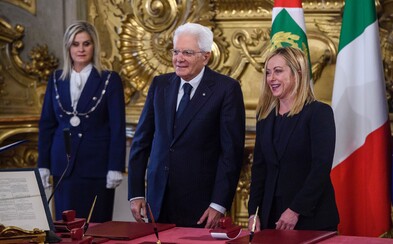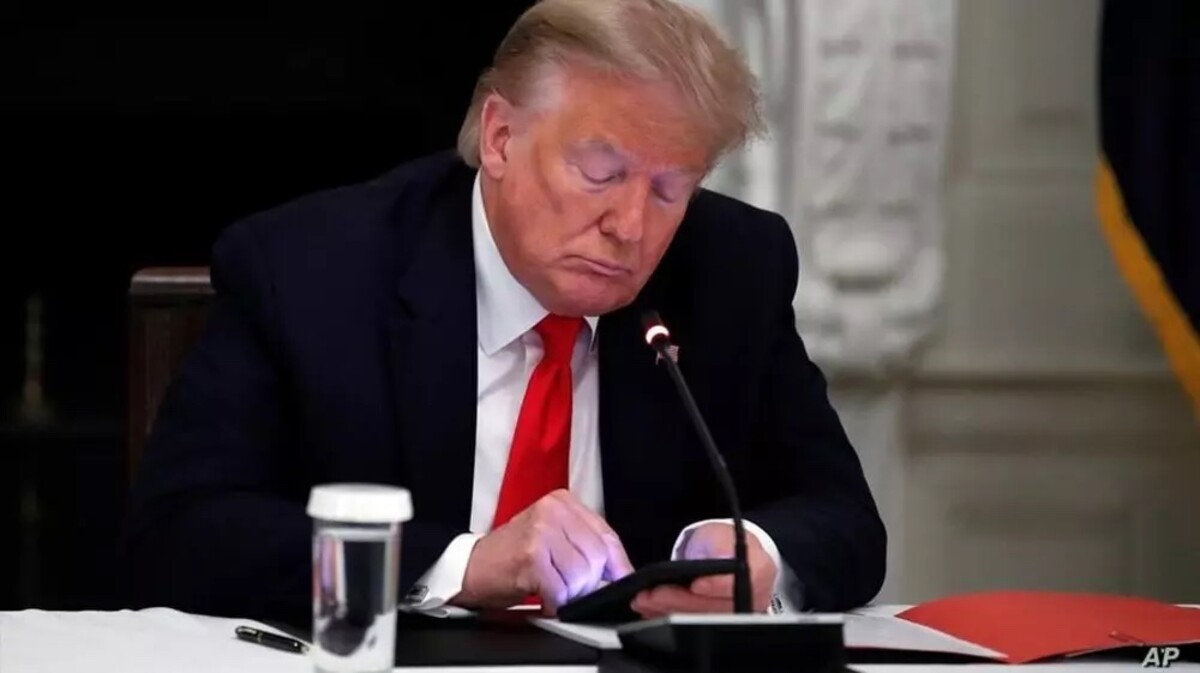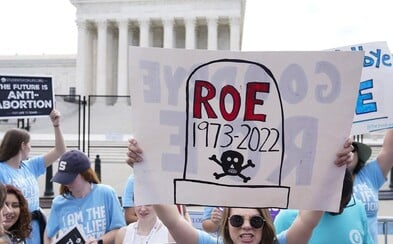 She Likes Fascist Symbols And Stands Against Abortion, LGBT And Migrants. This Is The Italian Prime Minister Giorgia Meloni
She Likes Fascist Symbols And Stands Against Abortion, LGBT And Migrants. This Is The Italian Prime Minister Giorgia Meloni
She Likes Fascist Symbols And Stands Against Abortion, LGBT And Migrants. This Is The Italian Prime Minister Giorgia Meloni
She Likes Fascist Symbols And Stands Against Abortion, LGBT And Migrants. This Is The Italian Prime Minister Giorgia Meloni
How Many Years In Prison Does Donald Trump Face After The FBI Raid? Explaining The Scandal
The former US president had a huge number of top secret documents in his villa in Florida.
If problems persis, please contact administrator.
They broke into his safe, searched his office, warehouses and basements and found so many top secret documents that he is now suspected of violating the Espionage Act. FBI agents removed more than 20 boxes full of documents from Trump's villa, many of which were never supposed to leave specially secured rooms.
Investigators are said to have feared that Donald Trump had sensitive documents at home about US nuclear weapons and national security that could cause disaster if they fell into the wrong hands. For example, the Russian ones.
Donald Trump has become the first US president in history to be investigated by the FBI under the Espionage Act. If he is eventually charged, proven guilty and convicted in court after the August 8 home search, Trump could end up in prison for up to 10 years for just one of the many crimes for which he is now being investigated.
As Trump tries to rant and defend his actions online, supporters of the ex-president are threatening to drop a "radioactive dirty bomb" on FBI agents and spark a civil war over the Mar-a-Lago raid.

Trump and documents
Donald Trump has never had a hard time dealing with sensitive documents and information. This behavior led to an FBI raid on the former president's Florida home on August 8, 2022.
During his four years as President of the United States of America, he repeatedly clashed with his advisers because he regularly tore up, shredded, or threw away official documents.
However, according to the Presidential Records Act, all materials with which the President of the United States works must be preserved and not destroyed. In one instance, a Trump adviser even saw him sitting at a desk in the Oval Office, stuffing torn pieces of paper into his mouth and chewing on them.
“When I walked into the Oval Office, I think Donald was chewing on what he had just torn up. It was very bizarre, because he is a germophobe and never puts paper in his mouth," stated the adviser. According to her, Trump realized over time that a number of sensitive documents would one day be published, so he preferred to get rid of them in any way possible.
The raid was carried out because the FBI allegedly had a spy on Trump
According to CNN, Trump apparently provoked the raid of federal agents in his residence on August 8 with his own behavior. The Presidential Records Act states that all documents after the end of the presidency are managed by the National Archives and Records Administration, but Trump had dozens of boxes of sensitive documents sent to his home after leaving the White House.
Last year, when the state archives began to deal with the fact that they did not have all the necessary materials from the time of the Trump presidency, representatives of the office asked the ex-president to take them from Mar-a-Lago and take them to the official archives, because they did not have anything at Trump's house search.
In January 2022, representatives of the office took the first 15 boxes from Mar-a-Lago. It soon emerged that Trump was keeping top secret documents at home, so the archive contacted the Department of Justice, which opened an investigation.
A number of conversations took place between Trump's lawyers and the department, and Trump agreed to turn over the next batch of documents, which happened in June. However, someone from the former president's team revealed to the department that Trump is lying when he claims that he has already given everything to the archivists.
The materials Trump continued to stash at Mar-a-Lago were of such enormous national security importance, according to Justice Department officials, that they decided to take a "politically explosive step" just to get them out of Trump's hands.
House search at half past seven in the morning
FBI agents raided Trump's residence on Monday, August 8. Trump commented on the raid with reluctance.
“The government could have whatever they wanted if we had it. Everything was great, better than previous presidents, and out of the blue and without warning, they raided Mar-a-Lago at 6:30 in the morning with a huge number of agents and safe-openers," the former president complained in a statement.
Investigators were granted a search warrant by a federal judge, who, however, allowed FBI agents to search only locations at Mar-a-Lago that could be used to store documents. Agents searched the basement, warehouses and finally Trump's office, where they broke open the safe.
These steps seem to have taken Trump by surprise, as he commented on the raid on his social network Truth Social saying that he was "fully cooperating" with the investigators and that he had built "very good relations" with them in the previous months together with his lawyers.
A box of top secret materials
Despite this, agents removed more than 20 boxes full of documents from Trump's residence. Affidavits of the raid results, later released by the Justice Department, indicated that one box contained "Top Secret/SCI" documents.
Binders labeled as SCI contain top secret material that may have a close connection to US national security and can only be read in specially designated security rooms inside government offices. Not only are they not allowed to be taken out of the offices, but under no circumstances are they to be stored in a safe in the former president's private residence.
In addition to the box containing these documents, FBI agents seized four boxes marked "Top Secret," three boxes containing documents marked "Secret," and three boxes marked "Confidential." In addition to the documents, they took out from Mar-a-Lago binders with photos, a pardon for Trump's associate Roger Stone, but also a binder with "information about the president of France."
According to the Washington Post, investigators were reportedly particularly concerned that Trump was storing top-secret information about the United States' nuclear weapons and capabilities in his residence, which could fall into the wrong hands through his fault. According to the newspaper, documents about nuclear weapons were indeed found during the raid, but the ministry did not officially confirm this.
Trump appears to have just admitted that he stole classified documents pertaining to nuclear weapons. pic.twitter.com/7kinhMk2No
— No Lie with Brian Tyler Cohen (@NoLieWithBTC) August 12, 2022
Does Trump face prison?
Donald Trump is suspected of violating three laws. The former US president is being investigated on suspicion of taking sensitive documents from the White House or destroying them, he is facing suspicion of obstruction of justice and finally suspicion of violating the Espionage Act.
If he is convicted of violating the Espionage Act, according to attorney Lisa Rubin, he faces a maximum sentence of ten years behind bars for this act alone among the three.
However, the Espionage Act does not necessarily mean that Donald Trump was secretly working with a foreign power and harming US interests. The law, passed in 1917, includes several crimes, and Trump could be suspected of, for example, holding top secret materials that he has refused to turn over to the state despite a request from the Justice Department to return them.
"Espionage cases are rare. Typically, as in the case of the Trump investigation, this law mainly applies to the unauthorised collection, possession or distribution of some sensitive government information," states academic Joseph Ferguson in regards to the Espionage Act.
At the same time, we do not even know the specific acts that Trump committed according to the investigators. The American ex-president has not yet been charged with any crime in this case.
Everything is said to be fine
Donald Trump himself and supporters of the former US president see no problem in storing top secret materials in a private residence in Florida. Trump claims that there is nothing illegal about keeping sensitive documents because he has not handled them in any way and has not shared them with anyone.
According to the Department of Justice, however, the problem is the fact that Trump even had binders with sensitive content important to national security in his vault. This is because they may contain information that could "actually harm the United States if it fell into the hands of a foreign power."
Supporters of the former president also defend Trump by saying that he did not commit a crime, because as president he "declassified the documents just by handling them" and thus, according to them, he could take them home.
"It doesn't really work that way. Presidential declassification of documents must be in writing and must have taken place while Trump was in office, not afterward," explains academic Joseph Ferguson. If the documents, according to Trump, were declassified, they should have been marked as such, but no marking or record of the declassification exists.
Moreover, according to Ferguson, the declassification of the documents does not mean that it is possible to handle them as Trump wanted. "The Espionage Act applies to all National Security Information (NDI)," he states. The law dictates that these materials must not be published publicly and must be treated as sensitive information under all circumstances.
Trump supporters are calling for civil war
Since Twitter suspended the ex-president's account, Trump has been looking for a platform to spread his thoughts. Finally, he founded his own social network, Truth Social, where he gathered thousands of his supporters.
He initially accused the FBI of preventing him from entering his own villa because agents were "trying to plant incriminating evidence".
But FBI investigators warn that the way Trump and his lawyers are defending themselves after the raid could trigger a wave of violence in American society.
When Attorney General Merrick Garland urged Trump after the raid to agree to release the entire contents of the search warrant along with its results, Trump initially agreed, but in the meantime apparently devised a way around Garland.
The former president received criticism for sending the full text of the search warrant to the far-right website Breitbart. He published it without blacking out the names of the FBI agents who participated in the raid. By publishing the names, he threatened their security, which Trump denies.
Meanwhile, the FBI has warned that it faces dangerous threats after the Mar-a-Lago raid. Trump's supporters are threatening FBI agents and the Department of Justice with the "targeted killing" of all employees involved, declaring "civil war" and "armed insurrection" against the US security forces and the government, as well as dropping a radioactive "dirty bomb" on the FBI headquarters.
If problems persis, please contact administrator.












